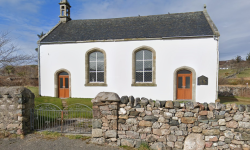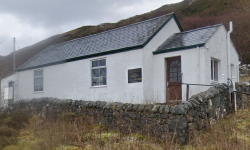Hugh Macleod D.D. of Cape Breton
In: John Murray, The History of the Presbyterian Church in Cape Breton, 1921, p68-70.
The Rev. Hugh McLeod was the last of the Pioneer Presbyterian ministers of Cape Breton, but he was not by any means the least. Indeed he was in many respects the greatest of them all. Dr. McLeod was born in the parish of Tongue, Sutherlandshire, Scotland, on the 23rd of April, 1803. After completing his primary and secondary education in the parish school of his native place he matriculated into King’s College, Aberdeen University in 1822, when nineteen years of age. Four years later he graduated from this famous University as a Master of Arts. He studied Theology and kindred subjects in that University during another four sessions, and finished his preparation for the ministry of the Church of Scotland in the year 1830. In the year 1831 he was licensed, by the Presbytery of Tongue, to preach the glorious gospel of the Grace of God to sinners, through the merits of Jesus Christ, His son. In 1832, Mr. McLeod was ordained and inducted as [missionary] minister of Melness and Eriboll by that same Presbytery. Four years later he was translated to the Presbytery of Edinburgh and inducted into the Gaelic Church of that city. After a ministry of several years in the Scottish capital, he was called to the rural charge of Logie Easter, Ross-shire, where he laboured until the year 1850, when he left his native land and came to Cape Breton.
It was during Dr. McLeod’s ministry in Logie Easter that the disruption in the Church of Scotland took place, and he had an active part in the stirring scenes that led up to that important event in the history of the Scottish Church. He was one of the 450 ministers that came out of the Established Church on the 18th of May, 1843, and that followed Dr. Welsh and Dr. Chalmers from St. Andrews Church on the Castle Hill to Cannon Mills’ Hall in the New Town where the Free Church was constituted. His large congregation followed him into the Free Church with the exception of half a dozen individuals. The Free Church shewed its appreciation of Dr. McLeod’s ability and worth by sending him out to Nova Scotia in 1845 as its deputy in the interests of the Free Church movement in these eastern Provinces of Canada.
Three years later he came again on a similar errand as the agent of the Scottish Free Church. On this occasion he came to Cape Breton and preached in a number of our congregations. He made a remarkable impression on our people as a preacher. He was dynamic. They had never heard such preaching before. The Presbyterian population of Eastern Cape Breton was profoundly stirred. They wanted to know if they could possibly have him come and stay among them as their minister. After some correspondence with himself and the Colonial Committee of the Free Church, they were encouraged to prepare a call and transmit it to Dr. McLeod through the Presbytery of Tain. Under the benign and persuasive influence of the Edinburgh Ladies Association, Dr. McLeod was moved to accept the call and to leave his native land, with all its prospects of usefulness and honour, and come to Cape Breton with all its disadvantages and difficulties. This call was signed virtually by all the adult Presbyterian population of Eastern Cape Breton, including Sydney, Sydney Forks, South Bar, Low Point, Bridgeport, Little Glace Bay, Schooner Pond, Cow Bay, Big Glace Bay, Back Lands Cow Bay, False Bay Beach, Mira River from bottom to top, Catalone, Main a dieu, Louisburg, Gabarus, Big Ridge and Caribou Marsh. It was an immense call and it represented the unanimous desire of an immense territory.
Dr. McLeod reached Sydney with his family of wife and three children on Saturday, August the 25th, 1850. On the following day he preached in the Methodist Church in the absence of the Rev. Jeremiah Jost, who was away to Ingonish on circuit duty at that time. He preached in the morning in Gaelic and in the evening in English. The next few weeks were spent in visiting his brethren and their congregations and in making himself acquainted with the conditions that prevailed in the island at that time. On the 2nd day of October the Free Church Presbytery of Cape Breton met at Mira Ferry (now Albert Bridge) for the purpose of inducting Dr. McLeod into the pastorate of the Mira Congregation. That Presbytery was composed of all the Free Church ministers then on the island of Cape Breton, viz. Rev. Matthew Wilson, Rev. Alexander Farquharson. Rev. James Eraser and Rev. Murdoch Stewart. Mr. Wilson as Moderator preached and inducted the minister; Mr. Farquharson preached in Gaelic from Psalm 102:2; Mr. Wilson preached in English from Isaiah 32:2. Mr. Stewart addressed the minister and Mr. Fraser addressed the people.
There was no church at Mira Ferry then, but that was the most central place in the congregation, and the most convenient for the induction services. The Presbytery was constituted and it conducted the services of the day under the canopy of a canvas tent, while the people sat in front of the tent under the shade of the forest trees. There were not less than 2,000 people there on that intensely interesting occasion from all parts of Dr. McLeod’s far flung parish. It was a bright calm autumn day and a day never to be forgotten by any who were privileged to witness the proceedings. Many in that great assembly had hoped and prayed and waited for the settlement of a minister among them ever since they came to Cape Breton. All this time they had been as sheep without a shepherd. But now the Great Shepherd had sent them one of the ablest preachers in Scotland to take the oversight of their souls. It was indeed a day of joy and gladness.
The Rev. Alexander Farquharson remained over the following Sabbath and introduced Dr. McLeod to his people according to the Scottish custom. He preached in Gaelic from Acts 13 :26, “To you is the word of this salvation sent.”
Mr. McLeod lived in Sydney until the spring of 1851. He passed his first winter in a small house on North Charlotte Street, nearly opposite St. George’s Episcopal Church. The following summer he bought a piece of land and built a house on the South Side of the Mira River and near where the Marion Bridge is now, in order to be as near the centre of his congregation as possible. After living on the Mira River for several years, he purchased the “Sherwood” property in Sydney from the late Edmund Dodd, Esq. and moved into the town. He spent the rest of his life on this property.
Dr. McLeod’s congregation covered nearly one-half the County of Cape Breton. It contained in all about five hundred families and three thousand souls. He continued sole pastor of this extensive charge until the year 1864, and pastor of a large part of it until 1885, when he retired from the active duties of the ministry.
In the year 1883, Dr. McLeod’s ministerial jubilee was celebrated in the original St. Andrew’s Church on Charlotte Street, with great enthusiasm. In his reply to a congratulatory address by the Presbytery of Sydney, he stated that he had spent seventeen years of his ministerial life in Scotland and thirty three years in Cape Breton; that during his long ministry there were several precious revivals through which great numbers of men and women were added to the membership of the church; that he had been Moderator of Presbytery twenty times. Moderator of Synod four times, and Moderator of General Assembly once; that he had preached 6000 sermons; baptized over 2000 persons, received 1,200 into full communion with the church, and solemnized 800 marriages.
Dr. McLeod was an outstanding church man in the Presbyterian Church, but he was more. He took a deep interest in everything that made for the welfare of the community, more especially, education and moral reform. He also took a lively interest in civil and political matters. He was an all-round man, well posted in current and national affairs. He also had the reputation of profound scholarship.
In his later years, Dr. McLeod was very much afflicted with a bronchial affection, induced probably by much speaking in the open air at communion seasons. He passed to his rest and reward on Friday, Jan. the 23rd, 1894, in the 91st year of his age, and the sixty-first of his ministry. Dr. McLeod was a preacher of rare eloquence and power, both in English and Gaelic. His preachings had several admirable qualities. His sermons were well arranged, scriptural and evangelical, forceful in utterance distinct in enunciation, always concise, and never long or tedious. He knew when to stop, and he always stopped at the point where his hearers were most deeply interested and anxious that he should continue. He had a fine, strong, sonorous voice that could be easily heard by the thousands that often hung on his lips on communion occasions under the blue canopy of heaven.
The Presbyterian Witness of Jan. the 27th 1894 had the following words regarding Dr. McLeod;— “A stronger man, a sturdier Highlander, a warmer hearted friend, a more powerful and searching preacher, a more useful leader of a great flock, or one who has done more for the advancement of his people, spiritually and materially, we do not know, we cannot name in the whole history of our Church from ocean to ocean.

